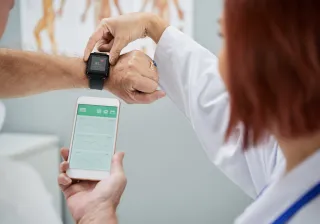Early diagnosis of memory disorders is a major challenge. Artificial intelligence (AI) can be used to accelerate diagnoses and bring forward the start of treatment. Combinostics, a spin-off of VTT, has introduced an artificial intelligence-based product which uses magnetic images to measure the state of a patient's brain.
A total of 47 million patients, or around one percent of the world's population, had Alzheimer's disease in 2015. It is estimated that 131 million people will be suffering from the disease in 2050.
Changes in the brain due to Alzheimer's disease begin by as much as decades before the initial symptoms appear. However, in most cases tests only begin when a close friend or relative has noted memory loss in the patient. The average delay from this point to final diagnosis is almost two years.
– In Europe, 20 months elapse between the first observation and diagnosis, confirms Chief Scientific Officer Jyrki Lötjönen of Combinostics.
Some 200 new pharmaceutical products for preventing the progression of Alzheimer's have been tested without success.
– Some of the tested medicines might work if the treatments were begun earlier, says Lötjönen.
Second opinion in support of physician's observations
A range of tests are needed for the diagnosis of Alzheimer's and other memory disorders: imaging, as well as cognitive, laboratory and spinal fluid tests. Combinostics, which was founded in 2014, has developed the AI-based cNeuro cMRI, which uses magnetic images to measure the state of a patient's brain.
cMRI is a tool for radiologists. Because this is a cloud service, the results are also available to the patient's own doctor.
The next step in development, cNeuro cDSI, will compare the CMRI and other test results with an extensive set of databases. This means that the results can be compared with those of previously tested patients and the probability of the disease emerging can be investigated.
– For example, the volume of the hippocampus, where tissue loss tends to begin in Alzheimer cases, can be compared to that of other healthy and affected patients, explains Lötjönen.
– Until now, diagnoses have been based on medical interpretations of different results. cDSI enables more systematic interpretation and provides a kind of second opinion in support of the physician's observations.
Sales negotiations have begun
Everybody says that the Chief Scientific Officer is crazy about his work. And little wonder, since system development is not just the result of Combinotics' four years in operation – research and development began much earlier than then.
Lötjönen and the company's four other founding members initially worked at VTT as researchers. The product development begun in 2011 led to the creation of a marketable product in three years; the company was founded around the product. One of the funding bodies is VTT Ventures, which invests in VTT spin-offs.
In practice, the business started up in 2015 under the leadership of CEO Lennart Thurfjell, who was recruited from the private sector. In 2016, the company was awarded a quality system certificate. Last year, cMRI and cDSI were launched on the European markets.
So far, a contract has been made with a few hospitals in Finland and Sweden, and with two hospitals in England.
Once FDA approval is obtained, the systems can also be marketed in the United States.
– We have signed a cooperation agreement with Siemens. They will begin marketing us first in the United States and later, on a broader basis, in Europe and Asia, says Lötjönen.
Lötjönen also sees marketing opportunities for non-neurological diseases.
– In fact, our first R&D project concerned cardiology, but we then received orders from the neurology side and decided to focus on that. We currently lack the resources to focus on other sectors, but are ready to discuss using the platform with companies engaged in R&D in other sectors, Lötjönen explains.
Development to continue
cCOG, a web-based cognitive test designed to identify changes due to memory disorders at an early stage, is currently in the test phase at Combinostics.
– Our goal is to ensure that Alzheimer and other memory disorders can be diagnosed in the future, before any symptoms appear. Achieving this may enable the effective use of tested treatments, Lötjönen hopes.
The research and development will include all university hospitals in Finland, the Karolinska Institutet and UMC Amsterdam, as well as VTT, which is serving as both a research partner and part owner.





